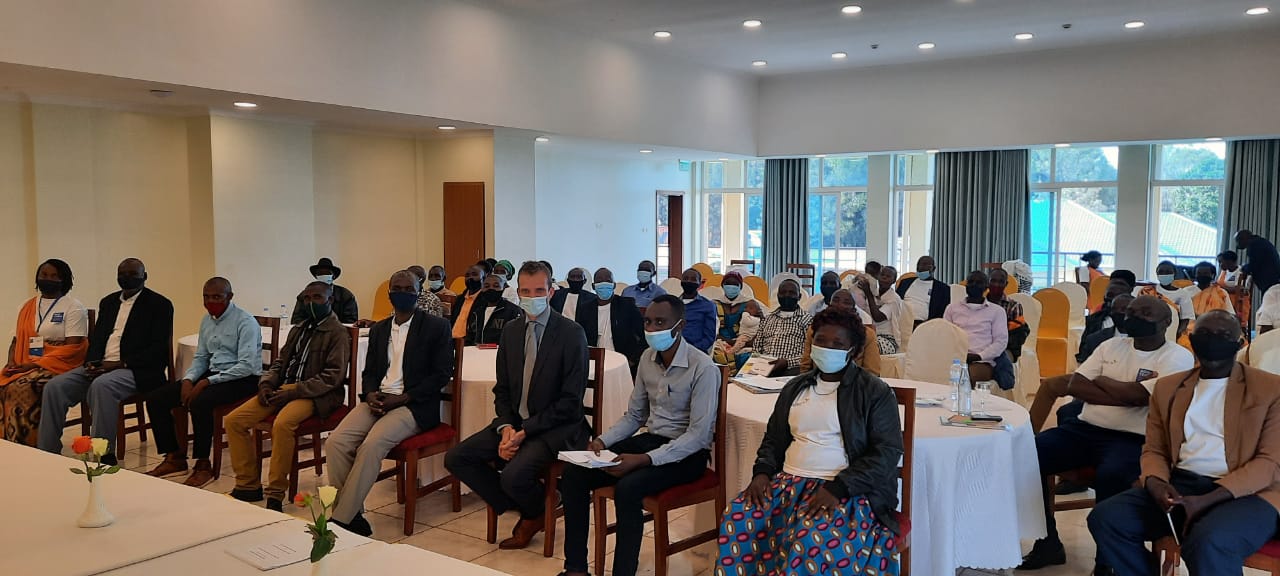

Over 3,000 farmers are set to benefit from a newly launched project by Agriterra, a Dutch organization specialized in cooperative business development.
Dubbed, "outgrower service company project for maize and soybean value chains”, the new initiative was launched on Friday, October 29, 2021 in Ngoma district during an event that involved signing an MoU between the founding members (Agriterra and the six farmer cooperatives) to create an outgrower Service company.
Run in partnership with Enabel (Belgian Development Agency) and the Rwanda Agricultural Board (RAB), the project aims at increasing the soybean and maize productivity and get the production delivered to the animal feeds industry in different parts of Rwanda.
It will be piloted in the district of Ngoma and scaled up in Kirehe and Gisagara next year.
Jasper Spikker, Agriterra Rwanda country representative explains how they came up with the initiative.
"We’ve learnt that Rwandan animal feeds millers are depending a lot on imports when it comes to maize and soybeans as raw materials for the animal feeds production, and that the local production is not meeting the demand of the animal feed industry because of low productivity and post-harvest losses,” he highlighted.
"Hence we want to increase farmers’ productivity and provide market opportunities at the same time, he added, through creating an outgrower service company that will supply farm inputs to farmers, offer extensions services, various training and buy the production from farmers at good prices.
This project’s budget is one million Euros in three years.
Dr Tesfaye Dalgie, the Intervention Manager of Partnership for Resilient and Inclusive Small Livestock Markets Programme(PRISM), asked the farmers to own this newly born outgrower service company and make use of it to benefit them.
"You have to own this company and work for it. Don’t leave it to the supporters because we will register success from it, if and only if farmers commit to work for it, serve it and maximise its potential,” he urged.


From left: Agriterra Country Representative Jasper Spekker with PRISM intervention Manager Dr Tesfaye. / Courtesy
On the side of the government, Egide Mutabazi, a market analyst in the Ministry of Agriculture and Animal Resources, stressed that the government will do its best to support the outgrower service company.
"We will do our best to ensure the targets we are aiming at are delivered through this company, because Agriterra is investing in the maize and soybean value chain that we (the government) also have a commitment in,” he said.
"We have tried to scale up the farmers’ productivity, but we can’t expand the land, but continuous training and advisory services including combating aflatoxins, will help us to address this, which is actually what this company is coming to do”.
Farmers optimistic
All farmers who talked to The New Times expressed optimism towards the project, describing it as a boost to their productivity.
Martin Ruganintwari who heads one of the local maize farmer cooperative in Ngoma district said that his fellow cooperative members have strongly supported the idea to create the company because they are hoping to get better market opportunities from the farmers’ company.
"After hearing about the Agriterra support, we decided to expand the land for maize and soybean crops, because with Agriterra we established our own company that will support the production activities and buy the production from members.
Viateur Majyambere, another farmer, said that they often had few or untrusted buyers of their produce.
"We often meet a challenge of late payments from our buyers, but this outgrower service company is our company that will first serve the interests of farmers. It will buy from us at good prices, pay us immediately, so that we start the next season earlier and develop the cooperatives we work through as well,” he emphasized.
Agriterra was launched in Rwanda in the year 2016 and all its agribusiness-centered activities focus on cooperative development.
Agriterra creates work opportunities and economic development in rural areas, which allows local farmers to generate higher sales figures and a stable income.
The global NGO was founded in 1997 by Dutch farmer organisations in the Netherlands but is currently working with farmers from different continents, including Latin America, Europe, Asia and Africa.


